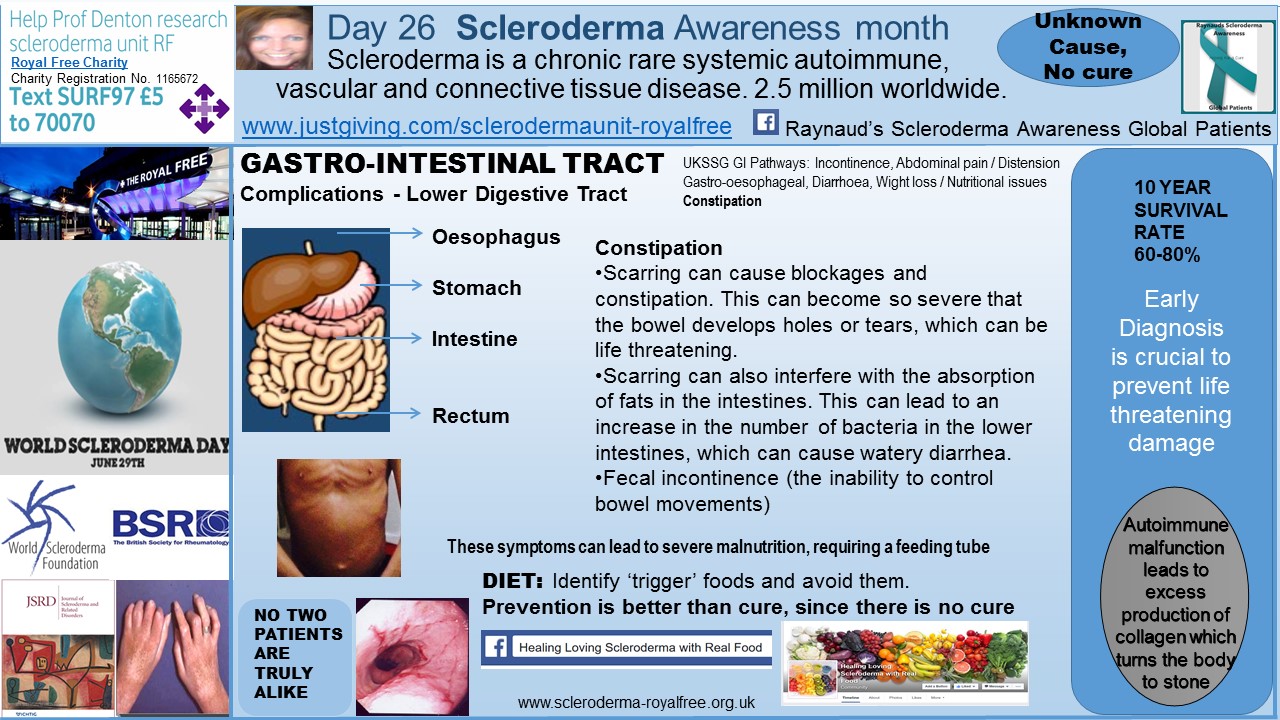DAY 26 Scleroderma Awareness Month: LOWER GASTRO-INTESTINAL TRACT

Today’s image and post focuses on the lower gastro-intestinal tract.
DAY 11 Scleroderma Awareness Month focused on the gastro-intestinal tract in general. To read about this, click here.
DAY 21 Scleroderma Awareness Month focused on the upper gastro-intestinal tract. To read about this, click here.
The lower gastro-intestinal symptoms that are experienced by scleroderma patients can at best be extremely uncomfortable and often cause personal embarrassment.
Scleroderma can affect the body’s ability to absorb nutrients as well as provide an environment for bacterial overgrowth prompting gastro-intestinal involvement.
The muscle of the bowel and sphincter can also be affected causing either constipation or incontinence, depending on the level of involvement.
As discussed in the other gastro-intestinal awareness posts, diet and medications can play a huge role in the gastrointestinal symptom involvement.
I changed my diet in 2012 and I have seen a dramatic improvement with my symptoms, particularly so, with less bloating, swelling and not as frequent toilet trips. To read more about this, click here.
As has been a common theme throughout this Scleroderma Awareness Month campaign – Prevention is better than cure, and identifying certain ‘trigger foods’ to then avoid them will help ease lower gastro-intestinal symptoms.
My fellow scleroderma patient friend Kelli Schrag has also changed her diet and seen improvements with her symptoms as a result. Kelli shares her diet/nutrition progress on the ‘Healing Loving Scleroderma with Real Food’ Facebook page, where I assist. Click here.
The UK Scleroderma Study Group (UKSSG) has put together some very helpful guidelines in managing the various aspects of the lower gastro-intestinal symptoms. To read more, click here
Sadly for some patients, irreversible damage to the gastro-intestinal system can mean that they require a feeding tube to ensure adequate nutrition.
The gastro intestinal system is most definitely a body part involved in the scleroderma process, which needs much more investment by way of research and clinical trials for improved patient care and management.
Note: Scleroderma is strictly a news and information website about the disease. It does not provide medical advice, diagnosis, or treatment. This content is not intended to be a substitute for professional medical advice, diagnosis, or treatment. Always seek the advice of your physician or other qualified health provider with any questions you may have regarding a medical condition. Never disregard professional medical advice or delay in seeking it because of something you have read on this website. The opinions expressed in this blog article are not those of Scleroderma News and are only intended to spark discussion about issues pertaining to the disease.







